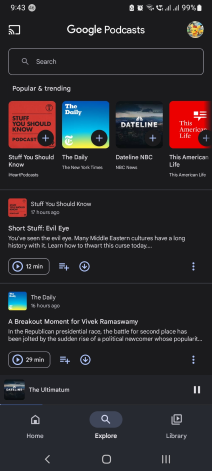| Google Podcasts | |||||
|---|---|---|---|---|---|
| | |||||
| Developer | Google LLC | ||||
| Initial release | June 18, 2018 | ||||
| Final release(s) [±] | |||||
| |||||
| Operating system | Android, iOS, Web | ||||
| Successor | YouTube Music | ||||
| Type | Podcast aggregator | ||||
| Website | podcasts | ||||
Google Podcasts was a podcast application developed by Google and released on June 18, 2018, for Android devices, and released on iOS devices on March 24, 2020.
On September 28, 2023, Google announced that it would shut down the service in the United States on April 2, 2024, [3] [4] [5] with a migration path to YouTube Music. Outside the United States, it was shut down on June 24, 2024. [5]
